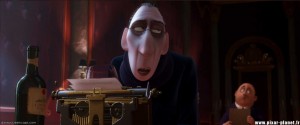An old friend of mine who sings jazz for a living just sent me a freshly recorded sound file on which she performs a song that I love, Joni Mitchell’s “A Case of You.” I’ve known her voice for the better part of two decades now, and it was, I thought, entirely mature when I first heard it. Yet something has happened to her singing in the past few years. While her style hasn’t changed in any obvious way, it has become more powerfully expressive. That kind of transformation is often the fruit of long experience, which has the power to etch the human voice over time with the marks of suffering—and transcendence.
 As I listened to my friend sing, I thought of the restaurant review that Anton Ego reads aloud (in the deliciously haughty voice of Peter O’Toole) at the end of Brad Bird’s Ratatouille. Ego is too often mistaken for an Addison DeWitt-type critic-killer, but in truth he is an aesthete of the highest possible seriousness who is all too aware of his own inability to create and thus profoundly respectful of those who, possessing that power, use it to the fullest. It is inexpressibly moving to hear him confess without self-pity that “the bitter truth we critics must face, is that in the grand scheme of things, the average piece of junk is probably more meaningful than our criticism designating it so,” and more moving still when he praises Remy and Colette for having cooked “an extraordinary meal…that rocked me to my core.”
As I listened to my friend sing, I thought of the restaurant review that Anton Ego reads aloud (in the deliciously haughty voice of Peter O’Toole) at the end of Brad Bird’s Ratatouille. Ego is too often mistaken for an Addison DeWitt-type critic-killer, but in truth he is an aesthete of the highest possible seriousness who is all too aware of his own inability to create and thus profoundly respectful of those who, possessing that power, use it to the fullest. It is inexpressibly moving to hear him confess without self-pity that “the bitter truth we critics must face, is that in the grand scheme of things, the average piece of junk is probably more meaningful than our criticism designating it so,” and more moving still when he praises Remy and Colette for having cooked “an extraordinary meal…that rocked me to my core.”
I never felt inadequate or frustrated when all I did was criticize the art of other people. I think this was because I tried to do so with a pure heart, seeking out opportunities to appreciate beautiful things rather than reveling in my power to smite the heathens. But I had spent several gratifying years as a professional bassist before becoming a full-time critic, and so I felt doubly blessed when I unexpectedly acquired in middle age the ability to write for the stage. I have no illusions about the significance of my late-blooming success as a playwright: as proud as I am of Satchmo at the Waldorf, I know that it’s small potatoes next to the plays of the supremely gifted writers whom it is my privilege to praise in the pages of The Wall Street Journal. Nevertheless, the fact that I somehow managed to write a new play of my own that gave pleasure to audiences cannot but have special meaning for a recovering musician like me who has never forgotten what it felt like to play jazz in public.
Robert Atkins, the author of Hand of God, which transfers to Broadway this week, recently gave an interview to the New York Times in which he said something about the experience of playwriting that I found striking:
It’s the most impossible thing in the world, but if you can do it, no one can say no to you. No one can say to you you’re wrong, because the entire audience—the room of 800, or 199, or 78 people experienced something. They laughed and they cried and they gasped and then they got up and they clapped. And no one—no academic, no father figure, can say to you that that didn’t happen. This is not academic, this is visceral, and that’s exciting. It’s sacred.
 I’m sure my friend feels the same visceral sensation whenever she gets up in front of an audience to sing. And though my own performing days are long since ended, I find it almost as exciting to sit in a theater and watch in silence and awe as my words are spoken aloud by a great actor. I doubt I’ll ever come any closer to getting up on stage myself and playing jazz again, the way I used to do a million years ago—but that’s close enough.
I’m sure my friend feels the same visceral sensation whenever she gets up in front of an audience to sing. And though my own performing days are long since ended, I find it almost as exciting to sit in a theater and watch in silence and awe as my words are spoken aloud by a great actor. I doubt I’ll ever come any closer to getting up on stage myself and playing jazz again, the way I used to do a million years ago—but that’s close enough.
* * *
Anton Ego’s monologue from Ratatouille:
Julia Dollison sings “Autumn in New York,” accompanied by Ben Monder on guitar, Matt Clohesy on bass, and Ted Poor on drums:


